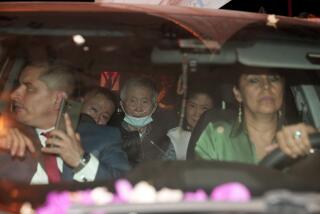Bush Meets With Peru’s Leader, Urges Congress to Release Aid
- Share via
WASHINGTON — Praising Peruvian President Alberto Fujimori for improving his country’s human rights record, President Bush urged Congress on Tuesday to release $94 million in U.S. aid to support a crop-substitution plan designed to persuade Peru’s peasant farmers to abandon cocaine cultivation.
“You have made progress on human rights,” Bush told Fujimori after their White House meeting, the first between American and Peruvian presidents since 1942. “Without this needed aid, cocaine traffic will continue unabated, and violence and abuses will increase unredressed.”
Fujimori, who was elected last June as the leader of a country wracked by inflation, terrorism and the drug trade, said the United States and Peru are “joined in a terrible intimacy in the war against drugs.”
“Peru produces 60% of the world’s coca leaf,” Fujimori said, referring to the raw material used in cocaine production, “while the United States consumes 80% of the world’s cocaine.”
Last July, about the time that Fujimori took the oath of office, Congress impounded economic and military aid intended for Peru on the grounds that the country’s authorities were guilty of widespread human rights abuses.
The independent human rights group Americas Watch last week urged Congress to maintain the ban, particularly on the $34 million in proposed military aid. The remaining $60 million is designated as economic assistance.
Capitol Hill critics, such as Rep. Ted Weiss (D-N.Y.), have accused the Administration of ignoring human rights abuses committed by Peru’s security forces.
However, Bernard Aronson, the State Department’s chief Latin American expert, said the Sendero Luminoso (Shining Path) terrorist organization is responsible for most of the country’s human rights abuses. While conceding that the armed forces are not blameless, Aronson said the situation is far better now than when Fujimori took office and that Peru should be rewarded for its progress, not penalized for failing to solve all of its problems at once.
Asked if the Administration would agree to a compromise that would eliminate military aid while providing economic assistance, Aronson said the crop-substitution plan will not work without a military force to provide “security for the coca farmers.” He said the farmers are subject to intimidation from narcotics traffickers and their terrorist allies.
More to Read
Sign up for Essential California
The most important California stories and recommendations in your inbox every morning.
You may occasionally receive promotional content from the Los Angeles Times.













